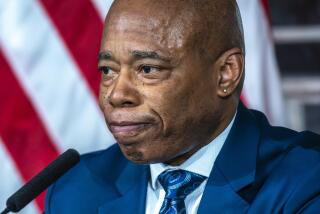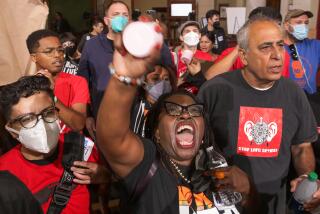Brutality Focus Now on NYPD
- Share via
NEW YORK — The protesters carried bathroom plungers, the weapon allegedly used by a policeman to sodomize Abner Louima, a Haitian immigrant, three weeks ago. A few wore bloodied surgical gloves, like those that police were said to have worn to protect themselves during the assault.
Others of the estimated 7,000 people who marched Friday on New York’s City Hall waved signs saying “NYPD Stop Hiring Sadists and Sociopaths” or simply “Stop Police Brutality.”
“I’m here because if we just let this go, nothing that needs changing here will change,” said Lionel Menard, a 45-year-old freelance artist and Haitian immigrant to Brooklyn. “We want the world to know this kind of thing should not happen to our people,” he said. “To anybody’s people.”
More than six years after a grainy videotape showed Los Angeles police beating Rodney G. King, the focus on how a city deals with police brutality has shifted east to New York.
And although some city officials say they have studied the way the King case was handled, New York’s administrators have found themselves facing many of the same angers and resentments from people in minority communities who believe that the police and judicial systems seldom work for them.
Moreover, like the King case in Los Angeles, the Abner Louima case in New York does not seem destined to fade into last month’s horror story. Despite rapid suspension of some officers and arrests of others, the incident is staying in the public eye as federal investigators look into the incident, as politicians and, possibly, famous lawyers like Johnnie L. Cochran Jr. become involved and as police critics seize on the event as evidence that although crime may be down, police abuse is not.
“Our police people do not act in a vacuum,” said City Councilman Lloyd Henry at a hearing on police brutality Thursday. “It’s been done in Los Angeles. It’s been done since the Rodney King incident, and in the end we have to know that . . . a person is a person no matter how small, no matter how different from us.”
After the incident on Aug. 9, Mayor Rudolph W. Giuliani and Police Commissioner Howard Safir moved quickly to investigate and accuse those believed to be involved in the beating and sodomizing of Louima, 30, in a bathroom in the 70th Precinct station after he had been taken into custody.
Louima, who has been recuperating from tears in his rectum, bladder and intestines, is still in critical condition at a New York hospital after emergency surgery Thursday night.
Four policemen have been arrested and many at the Brooklyn precinct have been suspended or moved to other jobs. The accused officers have denied guilt.
Giuliani also immediately put together a task force to study police brutality in the city. He included on the panel one of his most vocal critics, Norman Siegel, executive director of the New York Civil Liberties Union.
The task force evokes memories of the Christopher Commission, which analyzed the King incident in Los Angeles in terms of racism and the use of force by the LAPD. Its report has become one of the most important documents in big-city policing around the country.
“I did think about the Rodney King case when [the Louima case] happened,” Safir said earlier this week. “And I thought that had I been [in Los Angeles in the aftermath of the King beating], I would have handled it differently. And, as you saw, I did handle [the Louima case] differently.
“Once we determined that there was reason to believe that the alleged events had taken place, we needed to take very quick and decisive action rather than spend time trying to defend something that I believe was not defensible,” he said.
Still, the take-charge efforts of Safir and Giuliani have not put the issue to rest. One reason is that federal civil rights officials may be investigating whether Louima’s constitutional right to be safe from intentional use of unreasonable force was violated in the attack.
Another reason is that Giuliani, a Republican, is up for reelection in November. Although he appears in no danger of defeat, the incident is giving his opponents plenty of ammunition. Democrat Al Sharpton said Friday: “Crime is going down everywhere but the New York Police Department.”
Louima’s civil suit against the city is expected to seek a $465-million judgment. Several news organizations have reported that former O.J. Simpson defense attorney Cochran has signed on as an advisor to the case. Cochran’s office said Friday that he is out of the country and will issue a statement on the Louima case next week.
Although black and white leaders have warned their communities against tarring all police over the incident, some New Yorkers have already begun taunting officers on the streets. Early Friday a shot was fired at a police cruiser in the 70th Precinct. No one was injured, police reported.
The chants of protesters as they marched over the Brooklyn Bridge made it clear that many Haitians and other minorities blame the city’s administrators for creating a climate that could have allowed such abuse. Some also seemed to hold Giuliani and Safir accountable for any future action of the courts.
“No justice; no peace,” the protesters chanted. “No plea bargains” they shouted a few minutes later. And then, “No convictions, no votes.”
Such emotions are chilling given the reaction in Los Angeles after the March 1991 beating of King. A year later, when a jury acquitted the four police officers on all charges except one count of excessive force, the city erupted in riots that resulted in more than 50 deaths.
Shortly after the riots, LAPD Chief Daryl F. Gates resigned, and in April 1993, two of the four policemen seen on the King videotape were convicted on federal civil rights charges. King was eventually awarded $3.8 million in compensatory damages from the city.
The Louima case has also brought out some critics of the police commissioner. New York Daily News columnist Mike McAlary wrote Friday that Safir earlier had dismissed as “anecdotal” an Amnesty International report citing brutality in the NYPD.
Safir’s career, he noted, “will be framed forever by the Louima anecdote.”
And after Louima told reporters that as police assaulted him they said it was “Giuliani time,” implying that police had the full backing of the mayor, protesters have begun wearing buttons that say “No More Giuliani Time.”
At this point, however, many of the protesters seem more concerned about changing the system rather than ousting Giuliani or Safir.
Many want the city to require policemen to live in one of the five boroughs of New York, presuming that they would have more empathy with fellow New Yorkers if they lived in the same neighborhoods. Others have demanded an independent police review board. The present board has little clout in investigating or punishing rogue police. Similar ideas were floated in Los Angeles in the wake of the King case.
Others simply want Giuliani and Safir to make it clear that lowering the crime rate is not a justification for letting police assume they can get away with roughing up anybody in custody.
As Brooklyn Assemblywoman Rhoda S. Jacobs put it at a hearing on Thursday: “The message has to come from the top that aggressive pursuit of low-level crimes cannot be an excuse to violate the law and human rights.”
Times special correspondent Lynette Ferdinand contributed to this story.
More to Read
Sign up for Essential California
The most important California stories and recommendations in your inbox every morning.
You may occasionally receive promotional content from the Los Angeles Times.










